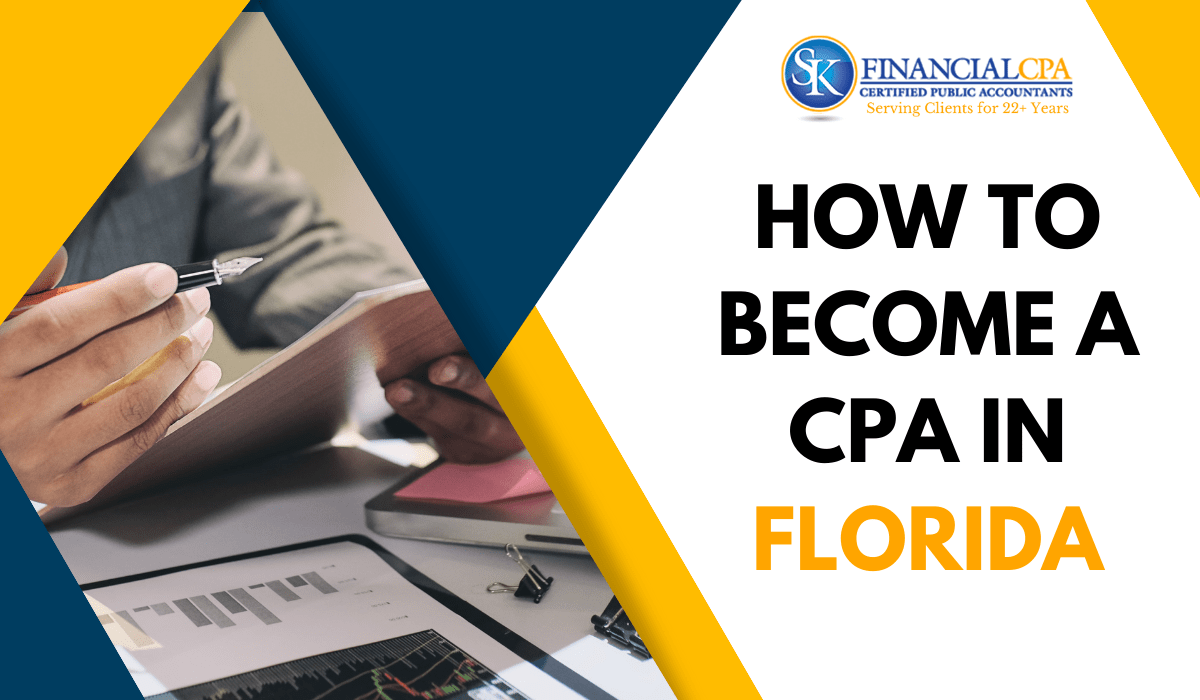
How to Become a CPA in Florida
The journey to become a Certified Public Accountant (CPA) in Florida is a decision that marks the beginning of a promising career in accounting, finance, and beyond. The CPA designation is not just a title; it's a testament to your expertise, ethics, and commitment to accounting.
This comprehensive guide is designed to walk you through each step of becoming a CPA in Florida, breaking down complex requirements into manageable tasks. From educational prerequisites to passing the CPA exam, gaining relevant experience, and upholding professional ethics, we'll cover everything you need to know to achieve your CPA certification in Florida.
In this article i will explain you How to Become a CPA in Florida? What are the requirments? Why you have to become CPA?
CPA Requirements in Florida
The journey to becoming a CPA in Florida is governed by specific requirements set by the Florida Board of Accountancy. These requirements ensure that all CPAs possess the necessary knowledge, skills, and ethical understanding to perform professionally at the highest standards. Let's delve into these requirements in greater detail.
Educational Requirements to become CPA in Florida
The educational path to CPA certification is designed to provide a strong foundation in accounting, business, and ethics. In Florida, the educational requirements are as follows:
-
You must complete 150 semester hours of post-secondary education. This typically includes a bachelor's degree, which accounts for 120 hours, plus an additional 30 hours, which can be achieved through a master's degree or additional coursework.
-
Your degree should be in accounting or a closely related field from an accredited institution. The accreditation ensures the quality and recognition of your education.
-
Within your education, you must complete specific coursework in accounting and business. This includes at least 36 semester hours in accounting subjects (beyond introductory courses) and 39 semester hours in general business courses. These courses cover crucial areas like taxation, auditing, financial accounting, and business law.
Educational Pathway
-
When selecting a college or university, consider programs specifically catering to aspiring CPAs. Look for programs that offer a CPA track or emphasize preparation for the CPA exam.
-
Work closely with an academic advisor to ensure your coursework meets the CPA requirements. Prioritize taking advanced accounting and business courses aligned with the CPA exam topics.
-
Many students opt for a Master's in Accounting or Taxation to fulfill the 150-hour requirement. This helps meet the educational criteria and deepens your expertise and preparation for the CPA exam.
CPA Examination
The CPA exam is a rigorous assessment designed to test your knowledge and skills across various areas of accounting and business.
The exam is divided into four sections:
1. Auditing and Attestation (AUD)
Test your knowledge of auditing processes, including ethics, professional responsibilities, and the preparation of reports.
2. Business Environment and Concepts (BEC)
Covers business concepts and the importance of understanding the business environment in which accounting functions operate.
3. Financial Accounting and Reporting (FAR)
Assesses your understanding of financial reporting frameworks from standards setters such as FASB, IASB, and GASB.
4. Regulation (REG)
Examines your knowledge of federal taxation, ethics, professional responsibilities in tax practice, and business law.
Preparing for the Exam
-
Enrolling in a CPA review course is highly recommended. These courses provide structured study materials, practice questions, and simulations that closely mimic the CPA exam.
-
Dedicate a consistent schedule for your CPA exam preparation. Balancing study time with work and personal commitments is crucial for success.
-
Regularly take practice exams to familiarize yourself with the exam format and identify improvement areas. This also helps in managing time during the actual exam.
Gaining The Required Work Experience
In Florida, CPA candidates must complete one year (2000 hours) of supervised work experience. This experience can be in public accounting, industry, government, or academia and must involve providing services or advice using accounting, attesting, compilation, management advisory, financial advisory, tax, or consulting skills.
Making the Most of Your Work Experience
-
Ensure your supervisor is a licensed CPA who can verify your work experience. This mentorship is invaluable for your professional development.
-
Seek opportunities to work on a variety of projects and tasks. This broadens your skills and understanding of different accounting practices and specialties.
-
Keep detailed records of your work experience, including the nature of your work, hours completed, and skills developed. This documentation will be necessary when applying for your CPA license.
Ethics Examination
The ethics exam is an open-book test designed to assess your understanding of professional conduct and the ethical standards expected of CPAs. The Florida Board of Accountancy specifies the approved ethics courses candidates can take to meet this requirement.
Approaching the Ethics Exam
-
Utilize the study materials from the ethics course to understand the AICPA's Code of Professional Conduct and other ethical frameworks.
-
Focus on understanding how ethical standards apply in real-world scenarios. This helps in both passing the ethics exam and practicing as a CPA.
-
Although the ethics exam is open-book, dedicate adequate time to studying and understanding the material before attempting the exam.
Check Out our expert services here.
FAQs
1. Do I need to be a Florida resident to become a CPA in Florida?
Answer: No, you do not need to be a Florida resident to become a CPA in Florida. However, you must meet the state's education, examination, experience, and ethics requirements.
2. Can I start gaining work experience before passing the CPA exam?
Answer: You can start gaining your required work experience before passing the CPA exam. However, it's essential to ensure that a licensed CPA supervises your work and meets the Florida Board of Accountancy's standards.
3. For how long must I pass all four CPA exam sections?
Answer: Once you pass the first section of the CPA exam, you have 18 months to pass the remaining three sections. If you do not pass all four sections within 18 months, the credit for the first passed section will expire, and you will need to retake it.
4. What happens if I fail a section of the CPA exam?
Answer: If you fail a CPA exam section, you can retake it in the next testing window. There is no limit to how many times you can retake a section of the CPA exam, but you must pass all four sections within 18 months.
5. Are there any continuing education requirements after becoming a CPA in Florida?
Answer: To maintain your CPA license in Florida, you must complete continuing professional education (CPE) credits every reporting period. The specific requirements can vary, so checking with the Florida Board of Accountancy for the most current CPE requirements is essential.
6. Can I transfer my CPA license to Florida from another state?
Answer: Yes, you can apply for CPA license reciprocity in Florida if you hold a valid CPA license from another state with similar licensure requirements. You will need to submit an application for licensure by endorsement and meet Florida's specific requirements, which may include passing the Florida-specific ethics exam.
7. How do I apply to take the CPA exam in Florida?
Answer: To apply to take the Florida CPA exam, you must apply to the Florida Board of Accountancy's website, along with your transcripts and any applicable fees. Once your application is reviewed and approved, you will receive a Notice to Schedule (NTS), allowing you to schedule your exam sections.
8. What is the cost of becoming a CPA in Florida?
Answer: The cost of becoming a CPA in Florida includes fees for education, the CPA exam application, examination fees for each section of the exam, ethics exam fees, and licensure application fees. Additionally, there are costs associated with any review courses or study materials. The total cost can vary widely depending on your specific circumstances.
Final Word on How to Become a CPA in Florida?
Becoming a CPA in Florida is a journey of dedication, learning, and professional growth. By meeting the educational requirements, passing the Uniform CPA Examination, gaining the necessary work experience, and upholding ethical standards, you'll be well on your way to this prestigious designation. Remember, becoming a CPA opens a world of opportunities in accounting and finance, offering a rewarding career that significantly impacts businesses and society. With hard work, persistence, and a commitment to excellence, you can become a CPA in Florida.
Follow SKFinancial on Facebook / Twitter / Linkedin / Youtube for updates.








